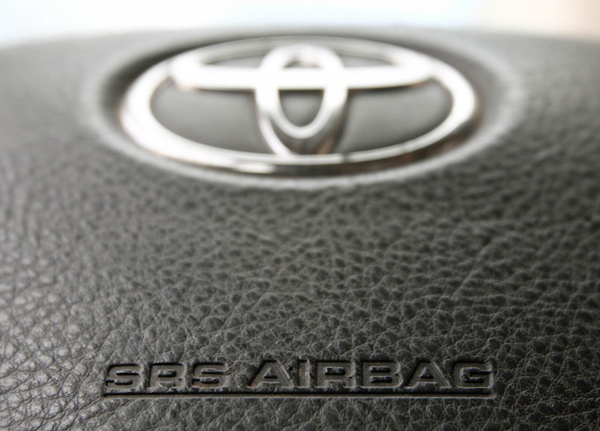Japan carmakers recall 3.4m unsafe vehicles
Updated: 2013-04-12 09:39
(Agencies)
|
||||||||
TOKYO/DETROIT - Four Japanese automakers, including Toyota Motor Corp and Nissan Motor Co, are recalling 3.4 million vehicles sold around the world because airbags supplied by Takata Corp are at risk of catching fire or injuring passengers.
The move announced on Thursday is the largest recall ever for airbags made by Takata, the world's second-largest supplier of airbags and seatbelts. Shares of Takata, which first learned of the issue in October 2011, tumbled almost 10 percent in Tokyo trading.
 |
|
The steering wheel of a Toyota car which contains an airbag is pictured in Vienna April 11, 2013. [Photo/Agencies] |
The recall, also including vehicles from Honda Motor Co Ltd and Mazda Motor Corp, is the largest since Toyota pulled back more than 7 million vehicles in October to repair faulty power window switches. The scale of the recent safety actions underscores the risk of huge global supply chain problems as automakers increasingly rely on a handful of suppliers for common or similar parts to cut costs, analysts have said.
Toyota, Honda and Nissan said there were no reports of injuries or deaths because of the defective airbags, which affect more than 1.3 million vehicles in the United States.
Airbags are flexible fabric envelopes that inflate rapidly to cushion occupants in an accident. They were rolled out broadly in the mid-1980s and early 1990s, and are now required in most developed countries, with many vehicles offering multiple airbags.
However, US requirements were changed in the late 1990s to lower the explosive force of airbag deployment after injuries caused by early generations of the technology.
In the current Takata recall, the airbag for the front passenger seat may not inflate correctly because of a manufacturing defect in the propellant used in the airbag inflator, the companies said. As a result, there is a risk of fires starting or of passengers being injured by metal fragments shooting up toward the windshield or down into the passenger foot well.
The recall covers some of the top-selling Japanese cars, including Toyota's Camry and Corolla, and rivals like the Nissan Maxima and Honda Civic. All of the vehicles in question were manufactured in or after 2000. None of the affected Camrys were sold in the United States.
UNWELCOME ATTENTION
The recall is not welcome news for Toyota, which took a hit to its reputation after it recalled nearly 19 million vehicles globally from late 2009 to early 2011 due to unintended acceleration claims.
"The huge recall is expected to generate a good deal of unwelcome attention, particularly for Toyota, as it strives to rebuild its reputation for quality in North America," IHS Automotive analyst Paul Newton said in a report.
Takata said it learned of the problem from an automaker it did not identify in October 2011 after an airbag deployment in Japan. It learned of a Honda accident in Puerto Rico the following month, according to documents filed with US safety regulators.
From February 2012 through June last year, Takata could not reproduce the problem in testing, but that autumn the supplier was alerted to three additional incidents - two in Puerto Rico and one in Maryland - according to documents filed with the US National Highway Traffic Safety Administration.
By October 2012, Takata concluded it was possible that the propellant in certain wafers made at its plant in Moses Lake, Washington, might be inadequately compressed, which could lead to the rupture, according to NHTSA documents.
By March this year, it also discovered that some wafers used in inflators made at a plant in Monclova, Mexico, for a year ending in late October 2002 may have been exposed to excess moisture, which could lead to a rupture, according to the NHTSA documents.
Takata is aware of only six cases where an inflator ruptured in vehicles in the field - four in the United States and two in Japan - as well as six cases in salvage yards in Japan, according to NHTSA documents.
- Chinese automakers expand in S.E. Asia
- Two Chinese firms bid for struggling automaker in US
- Strong China sales spur automakers' global success
- China automaker to recall defective school buses
- Japanese automakers face tough times in China
- US automakers bet billions on Russian car boom(视频)
- Top automakers gather in Dalian auto show

 Li Na on Time cover, makes influential 100 list
Li Na on Time cover, makes influential 100 list
 FBI releases photos of 2 Boston bombings suspects
FBI releases photos of 2 Boston bombings suspects
 World's wackiest hairstyles
World's wackiest hairstyles
 Sandstorms strike Northwest China
Sandstorms strike Northwest China
 Never-seen photos of Madonna on display
Never-seen photos of Madonna on display
 H7N9 outbreak linked to waterfowl migration
H7N9 outbreak linked to waterfowl migration
 Dozens feared dead in Texas plant blast
Dozens feared dead in Texas plant blast
 Venezuelan court rules out manual votes counting
Venezuelan court rules out manual votes counting
Most Viewed
Editor's Picks

|

|

|

|

|

|
Today's Top News
Boston bombing suspect reported cornered on boat
7.0-magnitude quake hits Sichuan
Cross-talk artist helps to spread the word
'Green' awareness levels drop in Beijing
Palace Museum spruces up
First couple on Time's list of most influential
H7N9 flu transmission studied
Trading channels 'need to broaden'
US Weekly

|

|








